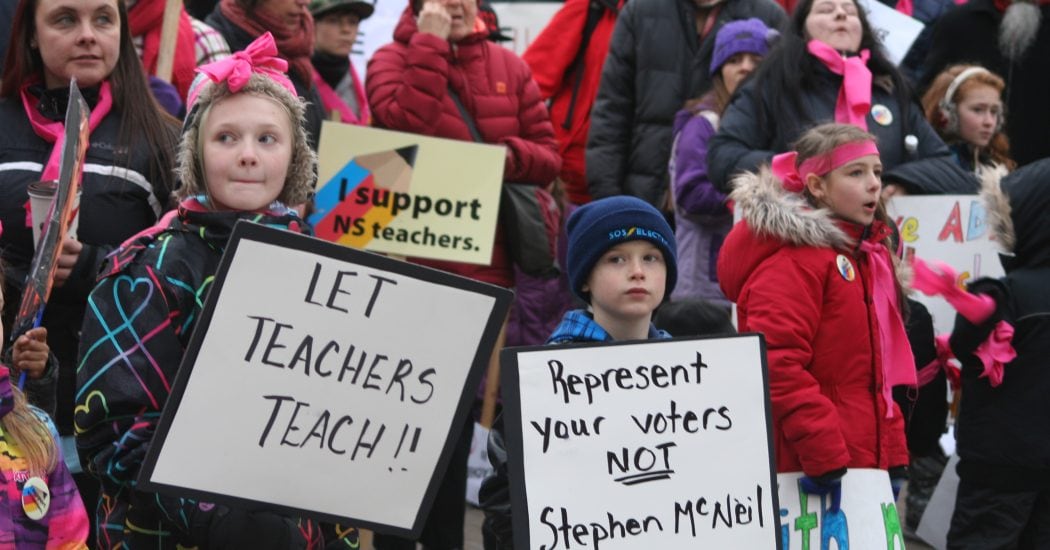The McNeil government’s attack on workers rights has been blistering. Our fightback must be more so. And our response must be profound solidarity.
This week the Nova Scotia Liberals threw collective bargaining under the bus. Again. And it matters to all of us.

The list of anti-union, anti-worker legislation from the NS McNeil Liberals has been as relentless, breathtaking and contemptuous as it is long. Contemptuous of Supreme Court of Canada decisions. Contemptuous of the Charter of Rights and Freedoms. Contemptuous of hard-working Nova Scotians, like over 4,500 Unifor members who work in health care and community services. Contemptuous of their federal colleagues working to build bridges with the labour movement.
Bill 19. Bill 30. Bill 37. Bill 1. Bill 100. Bill 148. And now Bill 75 – an imposed contract on the teachers of Nova Scotia.
Count them. Seven. Seven stunning pieces of legislation impacting workers and their collective bargaining rights since December 2013. It’s enough to make even Stephen Harper blush.
Unifor extends our sincere solidarity to the province’s teachers who went to the bargaining table, like we all have, with Bill 148 hanging over their heads. Bill 148 is the law that tells unions to negotiate wage freezes and concessions or have the wage freezes and concessions imposed on our members. It was introduced days before the holidays in December 2015.
This is not collective bargaining. And it speaks to a pattern by this government. A pattern of disdain for laws and rights, and a pattern of disrespect for government employees, for teachers, for health care workers. Disdain for anyone in a union.
We have a saying in the labour movement that an injury to one is an injury to all. To put this legislative assault into context, no working person is left unscathed.
Even our 1000s of Unifor members who work in the private sector in aerospace, forestry, shipbuilding, hospitality, or telecom are impacted by bad legislation that attacks and diminishes collective bargaining. They are certainly impacted when the government legislates wage freezes.
Because when the government attacks unions and workers, employers feel emboldened. When a government legislates the terms of a contract including wage freezes and concessions, why would private sector employers feel the need to pony up at the negotiating table? If you are not in a union, employers have an easy out: they are after all merely following the example of the government. Wage freezes all around.
This attack on wages also has harmful implications for the economy generally.
It sends a chill throughout the entire economy. And that chill hurts demand – in other words, no wage increases when everything else is going up means workers have less disposable income to spend in the economy. This means fewer jobs are created because of that lost spending power. Indeed, jobs are lost when spending power is reduced. It’s Economics 101.
Check out Unifor Economist Jordan Brennan’s analysis of the economic impact here: http://www.huffingtonpost.ca/jordan-brennan/mcneil-liberals-austerity_b_12656614.html
The full report is here: https://www.policyalternatives.ca/publications/reports/growth-austerity-and-future-nova-scotian-prosperity
Nova Scotians should ask themselves why the McNeil government has made unionized workers a target. He is certainly playing wedge politics, pitting public sector workers against everyone else.
But perhaps it is also to create a distraction from his government’s real problems, his weaknesses, from promises made and not kept. Like that promise to make health care better but instead his government slashed millions of dollars from long-term care budgets.
Because without this distraction occupying their television news, Nova Scotians will start asking tough questions and demanding an economic plan for the province that includes something other than balancing the books which isn’t much of a plan.
The premier said he wanted to streamline collective bargaining when instead his legislative assault has meant 97% of the public sector workers have not had their collective agreement renewed. No contracts settled. Just wreckage.
Collective bargaining in the province of Nova Scotia is completely and utterly broken and at a standstill.
Friends this is not success. It is what happens when you employ thuggish legislative interference.
The only thing that will stop the assault from this government is an election loss or a minority government. I know you have heard this before, but we have no choice here.
We must ensure this premier is not further emboldened. Every single one of us needs to be worried about what comes next.
We support teachers because they need our support, but also because we need theirs. It is as simple as that. It is solidarity.
We need teachers to mobilize and organize, just as Unifor has been mobilizing our members in long-term care and will be doing so with all our members throughout the province of Nova Scotia.
In the meantime, we must stand up. Be counted. Fightback. Resist. And persist.
So please call your MLAs. Give them a piece of your mind. Tell them to vote against Bill 75. Tell them as a health care worker you support teachers. Tell them as an aerospace worker you support teachers and health care workers. Tell them as a telecom worker, a forestry worker, a shipyard worker, as a parent, a neighbour, a trade unionist, as a Nova Scotian. Make sure they get the message.
We must be as relentless in our efforts as the Liberals have been in their attacks.
And we must be extra vigilant in mobilizing, organizing and building solidarity. We simply have no choice.
Lana Payne is the Atlantic Regional Director of Unifor.
Please support the Nova Scotia Advocate so that it can continue to cover issues such as poverty, racism, exclusion, workers’ rights and the environment in Nova Scotia.



